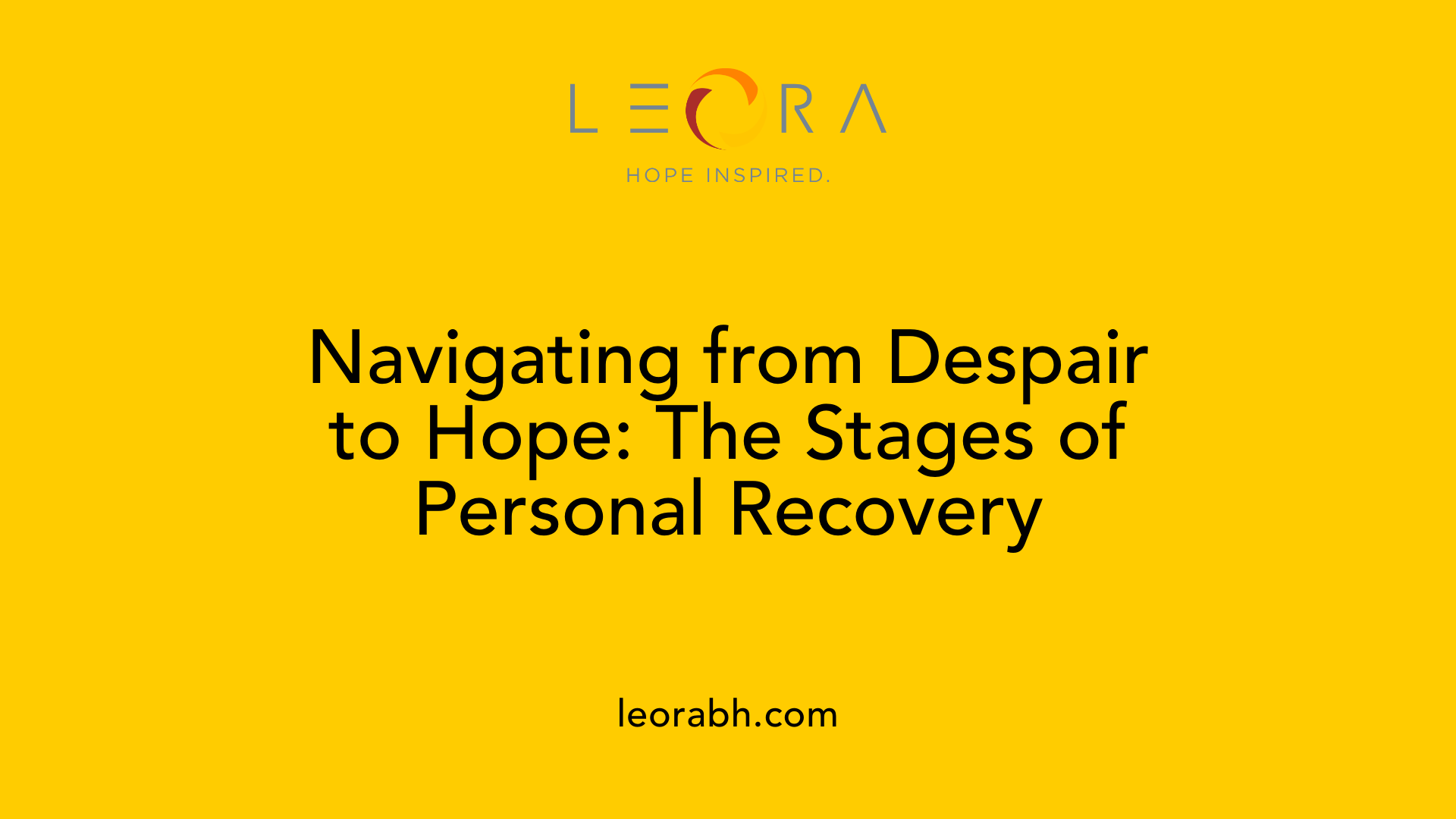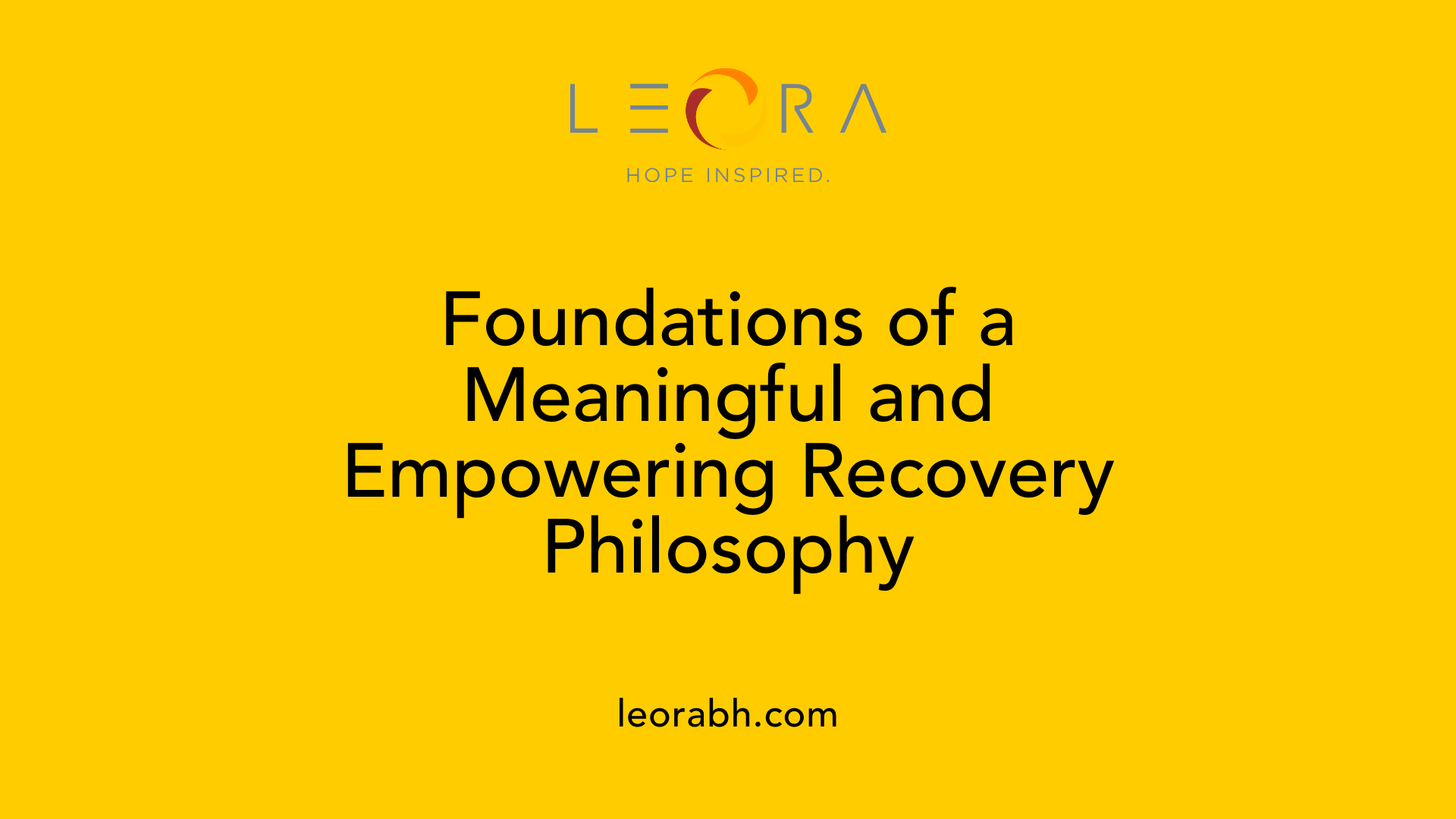How to Build a Personal Recovery Philosophy
Crafting Your Unique Path to Wellness
Understanding the Foundation of Personal Recovery
Building a personal recovery philosophy is a transformative journey that empowers individuals to take control of their mental health and addiction recovery. This process involves understanding core principles, developing meaningful goals, and integrating diverse strategies tailored to personal strengths and values. By establishing a solid foundation rooted in hope, self-determination, and holistic well-being, individuals can craft a recovery approach that is both effective and fulfilling.
Core Principles of a Personal Recovery Approach

What are the key principles and concepts of a personal recovery approach?
A personal recovery approach in mental health and addiction emphasizes the individual's role as the main driver of their recovery journey. Central to this philosophy is the idea of self-direction and personal choice, acknowledging that each person is the expert on their own life and should be empowered to determine their path to wellness.
This approach takes a holistic and strengths-based perspective, focusing on an individual’s abilities, resources, and aspirations rather than solely addressing symptoms or deficits. It respects cultural and personal differences and encourages tailoring recovery plans to suit unique circumstances.
Hope is a fundamental element that sustains motivation and resilience. Recovery is seen as an ongoing process that involves growth, learning, and overcoming setbacks. Recognizing that recovery is nonlinear helps individuals and support systems accept that progress can include both advances and challenges.
Peer support and collaborative partnerships with caring professionals foster social connectedness, reduce stigma, and promote participation in community life. By prioritizing autonomy, responsibility, and personal meaning, this approach aims to help individuals live satisfying, fulfilling lives beyond just managing symptoms.
In summary, the core principles are centered on personal choice, holistic strengths, hope-driven growth, and the understanding that recovery is a dynamic, individualized process that benefits from support, respect, and empowerment.
Stages and Processes of Personal Recovery

From despair to hope
The journey of personal recovery often begins in a place of despair, where individuals may feel overwhelmed by their mental health challenges or substance dependence. This initial phase can involve feelings of hopelessness and withdrawal, making it difficult to see a future beyond current struggles.
Building awareness of recovery potential
As individuals start to recognize that recovery is possible, they move into a phase of awareness. This stage involves opening up to the idea that change can happen, fostering hope, and beginning to explore personal strengths and resources. Support from peers and professionals can significantly bolster this awakening.
Planning and developing skills for change
The final stage focuses on preparation and action. Individuals develop a structured recovery plan that includes setting realistic goals, listing specific action steps, and establishing timelines. Learning new coping skills, addressing triggers, and building a support network are vital components.
A typical personal recovery process involves these interconnected stages:
| Stage | Description | Goals |
|---|---|---|
| Moratorium | Withdrawal and feelings of hopelessness | Recognize the need for change |
| Awareness | Realization that recovery is possible | Cultivate hope and explore resources |
| Preparation | Planning and skill-building | Create a concrete recovery plan |
Developing a personal recovery plan is about transforming hope into tangible actions. It includes prioritizing goals, writing them down, and starting with one focus at a time. Specific, measurable steps guide progress, while support from loved ones keeps motivation high.
Understanding these stages helps individuals acknowledge that recovery is not linear but a personal journey. With patience, resilience, and the right strategies, people can move from despair toward a fulfilling, self-directed life.
The Philosophy of Recovery: Foundations and Values

What is the philosophy of recovery?
The philosophy of recovery centers on the belief that living a meaningful, satisfying life is achievable despite mental health challenges. It emphasizes hope, self-determination, and personal empowerment, encouraging individuals to take an active role in their own care.
Recovery is viewed as a holistic journey that involves more than just symptom management. It includes building resilience, enhancing self-esteem, and strengthening relationships with family and community.
Support from professional services, peer resources, and healthy lifestyle choices—such as nutritious eating, regular physical activity, and stress reduction—are crucial to this process.
Fundamentally, this approach values respect, partnership, and hope. These principles guide support strategies that recognize each person as the expert of their own life, fostering autonomy and personal growth.
By embracing these core ideas, recovery becomes a dynamic process of transforming attitudes and behaviors, ultimately supporting individuals in leading fulfilling lives, beyond their illnesses.
Components and Elements of a Recovery Philosophy

What components are involved in building a comprehensive recovery philosophy?
A well-rounded recovery philosophy weaves together several important elements that uphold the principles of personal empowerment and holistic health. Central to this philosophy is self-direction, which champions the idea that individuals should lead and take responsibility for their own recovery journey. This promotes autonomy and encourages people to make choices aligned with their personal goals.
An individualized, culturally sensitive approach is another vital component. Tailoring recovery efforts to respect cultural backgrounds, personal values, and unique circumstances ensures that support systems are respectful and effective. Incorporating a strengths-based perspective allows individuals to focus on their abilities and resources rather than just their challenges, fostering a sense of hope and confidence.
Holistic care considers all facets of life—mental, physical, social, and sometimes spiritual—highlighting that recovery is an interconnected process. It recognizes that progress and setbacks are natural parts of growth, emphasizing resilience and the capacity to bounce back from difficulties.
Supportive elements such as peer involvement and community integration reinforce the importance of social connectedness and respect for diversity. Peer support offers shared experiences and mutual encouragement, helping to normalize recovery trajectories and reduce stigma.
Furthermore, core to the philosophy are principles of respect for individual rights and diversity, emphasizing that every person’s journey is unique. Personal responsibility is encouraged through education and active participation, empowering individuals to be their own advocates.
Fostering hope and resilience are other driving forces within this framework. These qualities motivate continued progress despite setbacks, reinforcing the belief that recovery is a dynamic, non-linear process capable of leading to a meaningful and fulfilling life.
Overall, these interconnected components create a comprehensive model that supports individuals in achieving holistic well-being, emphasizing choice, respect, and resilience on the path to recovery.
Developing Your Personal Recovery Philosophy
 Creating a personal recovery philosophy begins with deep self-reflection. Start by examining your core values, strengths, and what truly matters to you in life. This understanding helps shape your goals and guides your recovery journey.
Creating a personal recovery philosophy begins with deep self-reflection. Start by examining your core values, strengths, and what truly matters to you in life. This understanding helps shape your goals and guides your recovery journey.
Prioritizing health and well-being is essential. Focus first on fundamental needs such as physical health, safety, and basic self-care, which lay the foundation for future growth.
A comprehensive recovery plan should be detailed and tailored to your unique situation. Include specific, realistic action steps, set clear time frames, and identify sources of support. Regular review and adjustments keep the plan aligned with your evolving needs.
Incorporate core principles from recovery models—such as hope, empowerment, and self-determination. Recognize that recovery isn’t a straight path; setbacks and progress often happen simultaneously. Embracing this non-linear process allows flexibility and resilience.
Building a support network is vital. Surround yourself with positive, healthy individuals like friends, family, or peers. Including crisis contacts in your plan ensures you’re prepared for emergencies and can maintain accountability.
Remember, recovery is a highly personal journey. It should reflect your strengths, preferences, and aspirations, emphasizing independence, community involvement, and ongoing motivation. Using rewards and making firm commitments reinforce your dedication to the process.
By integrating these elements—self-awareness, strategic planning, support, and acceptance of the non-linear nature of recovery—you develop a philosophy rooted in hope, purpose, and resilience. This personalized outlook becomes a guiding compass as you navigate your unique path toward wellness.
Strategies for Crafting a Meaningful Recovery Plan
What strategies are effective for creating a meaningful and personalized recovery plan?
Developing an effective recovery plan requires thoughtful, tailored strategies that address individual needs and circumstances. One of the most important steps is setting SMART goals—Specific, Measurable, Achievable, Relevant, and Time-bound—across various areas such as health, relationships, and personal growth. This clarity helps maintain focus and track progress.
Breaking larger goals into manageable steps makes the process less overwhelming and allows for consistent small wins. For example, starting with a goal to improve sleep or nutrition can create a strong foundation for broader recovery efforts.
Regularly reviewing and adjusting the plan is vital. As progress is made or challenges emerge, reflecting on what is working and what isn’t helps keep the plan realistic and motivating. This ongoing process ensures that recovery remains personalized and responsive.
Building a support network including peers, family, mentors, or recovery coaches enhances accountability and provides emotional encouragement. These individuals can offer practical advice, celebrate successes, and help navigate setbacks.
Finally, adopting a flexible approach rooted in harm reduction principles can make recovery more manageable. It allows for small, incremental changes that respect individual realities without demanding perfection, fostering resilience and persistence.
Together, these strategies promote a dynamic, person-centered recovery plan that empowers individuals to regain control, foster hope, and pursue a fulfilling life.
Incorporating Philosophical and Evidence-Based Techniques
Incorporating both philosophical and scientific approaches can enrich a personal recovery plan. Evidence-based practices such as cognitive-behavioral therapy (CBT), rational emotive behavioral therapy (REBT), and motivational interviewing have been proven effective in promoting behavioral change, reducing symptoms, and supporting individuals on their recovery journey. These therapies focus on understanding negative thought patterns, managing triggers, and fostering motivation, providing a structured and empirical foundation for recovery.
Alongside these, philosophies like mindfulness and Stoic principles cultivate resilience, self-awareness, and emotional regulation. Mindfulness encourages present-moment awareness and acceptance, helping individuals observe their thoughts and feelings non-judgmentally. Stoic practices, developed by ancient philosophers, emphasize rational thinking, acceptance of what cannot be changed, and personal virtue, which can empower individuals to develop inner strength and resilience.
Supporting a person’s autonomy during recovery is essential. When individuals demonstrate the capacity for informed decision-making, they should be actively involved in choosing their treatment paths. This respects their personal agency and fosters commitment to their recovery goals. For those with limited decision-making capacity, externally guided, evidence-based interventions can provide consistent support while honoring their needs.
Effective recovery also relies on a strong therapeutic alliance— a trusting relationship between professionals and individuals. This partnership encourages ongoing engagement, supports goal setting, and emphasizes consumer participation. Engaging individuals in discussions about their goals, values, and preferences ensures that treatment aligns with their personal meaning and life context.
By integrating these approaches, practitioners create a holistic, personalized pathway to recovery. This involves tailoring therapies to individual needs, emphasizing participation and empowerment, and continuously refining strategies through research and advocacy. Ultimately, combining evidence-based techniques with philosophical insights fosters resilience, autonomy, and sustained well-being on the journey to recovery.
Frameworks and Methods Supporting Personal Recovery
Several approaches and programs exist to assist individuals on their recovery journey in mental health and addiction. The Wellness Recovery Action Plan (WRAP) is a personalized, structured tool that helps individuals identify triggers, set goals, and develop action steps to maintain wellness. Peer support groups such as Alcoholics Anonymous, SMART Recovery, and community-based programs offer invaluable mutual encouragement, shared experiences, and accountability.
The four essential pillars of recovery—health, home, purpose, and community—form the foundation for building a fulfilling and balanced life. Focusing on health includes adopting healthy eating habits, regular physical activity, and mindfulness practices. Secure housing, meaningful daily activities, and social connections strengthen stability and foster independence.
Accessing professional services and resources is vital. The Substance Abuse and Mental Health Services Administration (SAMHSA) provides a confidential National Helpline, offering referrals to treatment centers, support groups, and community resources. Utilizing these services often involves ongoing engagement with mental health professionals and participating in therapy, medication management, and family support.
Engaging in activities that promote well-being further supports recovery. These include regular exercise, meditation, journaling, and participation in social or educational programs. Virtual support options and telehealth services have expanded the accessibility of continuous care, allowing individuals to maintain momentum regardless of location.
By integrating structured programs, community involvement, and self-care activities, individuals can sustain recovery, develop resilience, and live meaningful lives aligned with their personal goals.
Defining and Achieving Recovery Goals and Routines
How can individuals define their recovery goals and routines effectively?
Creating a clear and personalized recovery plan begins with understanding one’s own strengths, values, and priorities. A person-centered approach encourages individuals to identify what they truly want to achieve in their recovery journey, whether that involves gaining independence, rebuilding relationships, or pursuing new opportunities.
Using the SMART framework—making goals Specific, Measurable, Achievable, Relevant, and Time-bound—helps set clear direction. For example, rather than vague goals like "I want to feel better," SMART goals specify actions such as "attend three peer support meetings weekly for the next month." Breaking larger goals into smaller, manageable steps makes them less overwhelming and easier to accomplish.
Reflecting regularly on progress is vital. Keeping journals, using reflection worksheets, or asking guiding questions allows individuals to evaluate what is working and what needs adjustment. This ongoing review fosters flexibility and resilience, helping to overcome setbacks.
Developing routines by establishing consistent daily practices—such as mindfulness exercises, medication schedules, or regular check-ins with support networks—creates stability and momentum in recovery.
Engaging support systems, including friends, family, or peer groups, provides encouragement and accountability. Celebrating milestones, whether big or small, boosts confidence and motivation, reinforcing positive behaviors.
By combining self-awareness, structured planning, and community support, individuals can effectively define and pursue meaningful recovery goals, making their paths more sustainable and fulfilling.
Embracing Your Personal Recovery Journey
Developing a personal recovery philosophy is an empowering process that invites introspection, goal-setting, and ongoing reflection. It involves integrating core principles such as hope, self-determination, respect, and holistic well-being. By creating tailored recovery plans, utilizing evidence-based and philosophical techniques, and building strong support networks, individuals can navigate their unique paths toward resilience and fulfillment. Remember that recovery is a lifelong journey marked by growth, setbacks, and perseverance. Embracing your own values and strengths ensures that your personal recovery philosophy remains authentic and effective, guiding you toward a meaningful and satisfying life.
References
- Developing Your Personal Recovery Plan (Template Included)
- How to Develop a Successful Personal Recovery Plan
- A Philosophy Of Recovery - IDHS
- What is a recovery oriented approach? - NSW Health
- Recovery and mental health - Healthdirect
- Our Recovery Philosophy | Holistic Addiction Approach
- My Personal Philosophy on Life and Recovery
- Adopting a Growth Mindset for Addiction Recovery
Find Your Inner Light
Related Articles
Schedule an Assessment
Leora Behavioral Health provides comprehensive treatment services, including ambulatory detox, mental health IOP, and SUD IOP, to support your journey toward lasting recovery.
Our caring team will guide you through the admissions process and create a personalized treatment plan tailored to your unique needs. We welcome walk-ins. If you or a loved one is struggling, reach out today. We’re here to help.


.svg)




.svg)
.svg)
.svg)
.svg)
